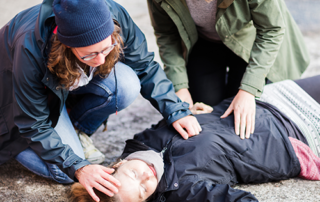Welcome to the Kloxxado® Naloxone Blog
Find the latest news about Kloxxado® (naloxone HCl) Nasal Spray 8 mg, as well as helpful information about opioid overdose safety, opioid addiction treatment and recovery. Check back often to see our latest blog posts.
Fentanyl Remains a Threat—Keep Naloxone on Hand for Opioid Overdose
Here’s some encouraging news: According to an August 2024 article in Scientific American, opioid overdose deaths have declined slightly since their peak during the COVID-19 pandemic.1 And here’s another [...]
Act Fast and Reverse Opioid Overdose With Naloxone
If you’ve seen the news lately, you know that opioid overdose deaths have reached record highs in recent years.1 But what many people may not be aware of are [...]
The Importance of Naloxone for Older Adults on Medications
Did you know that more than half of adults aged 65 and older take 4 or more prescription drugs?1 For many, it’s because they’re managing conditions like high blood [...]
Keep Naloxone on Hand During the Holidays
When you consider that it gets dark earlier, stress levels seem to be higher and the “holiday blues” are common, it’s not surprising that 81% of people who took [...]
Polysubstance Use and Naloxone
A new phase of the fentanyl crisis in America Historically, the opioid epidemic in this country has been described as having three “waves.”1 Now, however, we appear to be [...]
Chronic Pain? What to Know When an Opioid Is Part of Your Treatment
Chronic pain is a debilitating condition that affects millions of Americans.1,2 It can impact all different aspects of a person’s life, and has been linked to depression as well [...]
Naloxone in Schools Saves Lives
If you’ve spent any time in a school, you probably know about the emergency procedures in place to keep students safe from threats like fires, tornadoes and earthquakes. But what about drugs in schools? Opioids specifically? According to the Centers for Disease Control and Prevention, opioids like fentanyl are claiming the lives of our nation’s kids at alarming rates.1,2 In 2021, for example, fentanyl was involved in 84% of all overdose deaths among teens.1 So what can parents and school administrators do to fight back? Treat opioids like other threats, and formulate an emergency plan that includes keeping naloxone in schools for opioid overdoses. Read on to learn more about how naloxone in schools saves lives.
The Top 4 Places You Need Naloxone
Bars. Nightclubs. Concert venues. Parties on college campuses. What do they all have in common? They’re all places people go to be social and have a good time. Unfortunately, [...]
KLOXXADO® (naloxone HCl) Nasal Spray 8 mg Shelf-Life Extended from 24 months to 36 months
Read the news release from Hikma Pharmaceuticals announcing the shelf-life extension of KLOXXADO® (naloxone HCl) Nasal Spray 8 mg.
Where to Get the Opioid Overdose Antidote, Kloxxado® (naloxone HCl) nasal spray 8 mg
Here's what you need to know about Kloxxado® For the first time in five years, data from the Centers for Disease Control show a slight reduction in the number [...]












